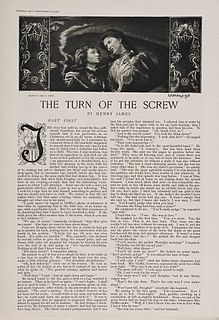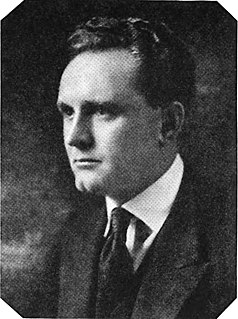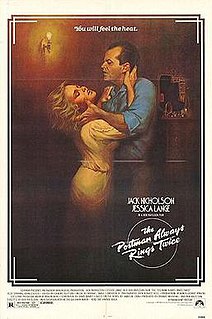
Arms and the Man is a comedy by George Bernard Shaw, whose title comes from the opening words of Virgil's Aeneid, in Latin: Arma virumque cano.

Night Shift is the first collection of short stories by Stephen King, first published in 1978. In 1980, Night Shift received the Balrog Award for Best Collection, and in 1979 it was nominated as best collection for the Locus Award and the World Fantasy Award. Many of King's most famous short stories were included in this collection.

The Guardsman is a 1931 American pre-Code film based on the play Testőr by Ferenc Molnár. It stars Alfred Lunt, Lynn Fontanne, Roland Young and ZaSu Pitts. It opens with a stage re-enactment of the final scene of Maxwell Anderson's Elizabeth the Queen, with Fontanne as Elizabeth and Lunt as the Earl of Essex, but otherwise has nothing to do with that play.

Robert William Chambers was an American artist and fiction writer, best known for his book of short stories titled The King in Yellow, published in 1895.

"The Tell-Tale Heart" is a short story by American writer Edgar Allan Poe, first published in 1843. It is related by an unnamed narrator who endeavors to convince the reader of the narrator’s sanity while simultaneously describing a murder the narrator committed. The victim was an old man with a filmy "vulture-eye", as the narrator calls it. The narrator emphasizes the careful calculation of the murder, attempting the perfect crime, complete with dismembering and hiding the body under the floorboards. Ultimately, the narrator's feelings result in hearing a thumping sound, which the narrator interprets as the dead man's beating heart.

The Turn of the Screw is an 1898 horror novella by Henry James that first appeared in serial format in Collier's Weekly magazine. In October 1898, it appeared in The Two Magics, a book published by Macmillan in New York City and Heinemann in London. Classified as both gothic fiction and a ghost story, the novella focuses on a governess who, caring for two children at a remote estate, becomes convinced that the grounds are haunted.

"The Cask of Amontillado" is a short story by Edgar Allan Poe, first published in the November 1846 issue of Godey's Lady's Book. The story, set in an unnamed Italian city at carnival time in an unspecified year, is about a man taking fatal revenge on a friend who, he believes, has insulted him. Like several of Poe's stories, and in keeping with the 19th-century fascination with the subject, the narrative revolves around a person being buried alive – in this case, by immurement. As in "The Black Cat" and "The Tell-Tale Heart", Poe conveys the story from the murderer's perspective.

Frank Borzage was an Academy Award-winning American film director and actor, known for directing 7th Heaven (1927), Street Angel (1928), Bad Girl (1931), A Farewell to Arms (1932), Man's Castle (1933), History Is Made at Night (1937), The Mortal Storm (1940) and Moonrise (1948).

Armand Anthony Assante is an American actor. He is perhaps best known for his roles as mobster John Gotti in the 1996 HBO television film Gotti, as Nietzsche in When Nietzsche Wept, and as Mickey Spillane's Mike Hammer in 1982's I, the Jury. His performance in Gotti earned him a Primetime Emmy Award and nominations for the Golden Globe Award and the Screen Actors Guild Award.
A film adaptation is the transfer of a work or story, in whole or in part, to a feature film. Although often considered a type of derivative work, film adaptation has been conceptualized recently by academic scholars such as Robert Stam as a dialogic process.

Tonie Marshall was a French-American actress, screenwriter, and film director.

Barry Jones was an actor seen in British and American films, on American television and on the stage.
Tales of the Wizard of Oz is a 1961 animated television series produced by Crawley Films for Videocraft. This is the second animated series produced by the studio, and the first by Rankin/Bass to feature traditional animation.

The Postman Always Rings Twice is a 1981 American neo-noir erotic thriller film directed by Bob Rafelson and written by David Mamet. Starring Jack Nicholson and Jessica Lange, it is the fourth adaptation of the 1934 novel by James M. Cain. The film was shot in Santa Barbara, California.

Maxine Audley was an English theatre and film actress. She made her professional stage debut in July 1940 at the Open Air Theatre. Audley performed with the Old Vic company and the Royal Shakespeare Company many times. She appeared in more than 20 films, the first of which was the 1948 adaptation of Anna Karenina.

Robbery Under Arms is a bushranger novel by Thomas Alexander Browne, published under his nom de plume Rolf Boldrewood. It was first published in serialised form by The Sydney Mail between July 1882 and August 1883, then in three volumes in London in 1888. It was abridged into a single volume in 1889 as part of Macmillan's one-volume Colonial Library series and has not been out of print since.

Cell is a 2016 American science fiction horror film based on the 2006 novel of the same name by Stephen King. The film is directed by Tod Williams, produced by John Cusack, with a screenplay by King and Adam Alleca. The film stars John Cusack, Samuel L. Jackson, and Isabelle Fuhrman. The film was released on June 10, 2016 to video on demand, prior to a limited release scheduled for July 8, 2016. Cell is the second film adaptation of a King story to co-star Cusack and Jackson, after the 2007 film 1408.
W. P. LipscombWilliam Percy Lipscomb, was a British-born Hollywood playwright, screenwriter, producer and director. He died in London in 1958, aged 71.

Discworld is a comic fantasy book series written by the English author Terry Pratchett, set on the Discworld, a flat planet balanced on the backs of four elephants which in turn stand on the back of a giant turtle. The series began in 1983 with The Colour of Magic and continued until the final novel The Shepherd's Crown was published in 2015, following Pratchett's death. The books frequently parody or take inspiration from J. R. R. Tolkien, Robert E. Howard, H. P. Lovecraft, Charles Dickens and William Shakespeare, as well as mythology, folklore and fairy tales, often using them for satirical parallels with cultural, political and scientific issues.















